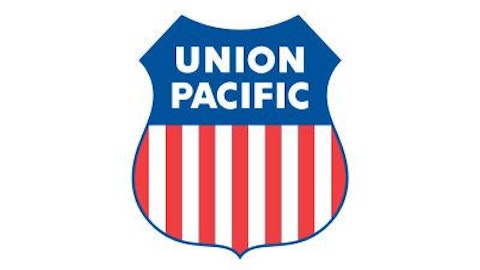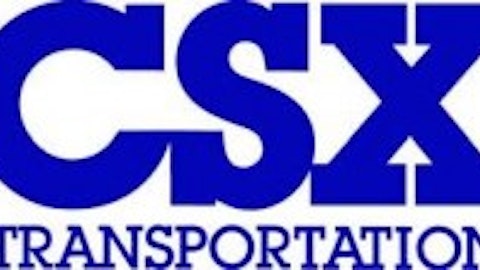
The Company’s Lack Of Clarity Provides Opportunity
Unfortunately for Norfolk Southern investors, the company doesn’t give as much detail in their earnings as their competition. It’s not unusual for Union Pacific Corporation (NYSE:UNP) to give some detail about coal shipments, autos, chemicals, and other industries. CSX Corporation (NYSE:CSX) goes even further by making comments about why they believe shipments were up or down in certain industries. If you want to know the future direction of the economy, look at the railroad earnings reports.
Norfolk Southern for some reason hasn’t gotten on board (pardon the pun) with this idea. The company only reports three segments, coal, general merchandise, and intermodal. In the current quarter, general merchandise revenue was up 4%, and intermodal revenue increased 5%. The bad news just kept on coming from the coal industry, as coal revenues were down 23%. Since Norfolk gets 24.48% of its revenues from coal, this was a major drag on results.
Norfolk did at least give some information on the direction of volumes in several industries. The company singled out chemicals, auto, and housing shipments as all being up in the last few months. What this tells investors is, coal is the problem, and if this relationship changes, Norfolk Southern investors could be in for a nice surprise.
In The Meantime…
I won’t begin to predict when coal shipments will slow their decline or turn upward, but I do understand supply and demand. It’s likely that coal is experiencing a trough because of low natural gas prices. As natural gas prices stabilize, coal demand will pick back up.
While investors wait for this to occur, Norfolk Southern is doing what they can for shareholders. If you look at their operating cash flow, you get a sense of management’s responsible decision making. Union Pacific was the only one of the big three to report growth in operating cash flow of 4.9%. However, this was due to a smaller reliance on coal (20.08% of revenue) and a lower rate of decline (7%). CSX on the other hand, saw a decline of 15.61% in operating cash flow. The company has a larger reliance on coal (25.9%), and reported a significant decline in revenue from this industry of 18%. By comparison, Norfolk Southern saw operating cash flow decline by just 5.02%, because management tried to mitigate the damage by reducing expenses.
One way that Norfolk significantly outperformed its peers was by repurchasing shares over the last year. Norfolk retired nearly 6% of their diluted share count in the last year. CSX retired 2.65% and Union Pacific retired about 3%. With relatively twice as many shares retired, when earnings improve, Norfolk’s EPS should improve faster than their competition.
Norfolk’s history of outperformance suggests that they may continue to surprise analysts. While it’s true that past history may not necessarily predict results, it’s amazing the number of times a company continues to exceed estimates when they have established this pattern. Believe it or not, all three major railroads exceeded analyst expectations in all four quarters last year. However, analysts are calling for 10.44% growth at Norfolk versus 12.15% growth at CSX and 14.43% growth at Union Pacific. Even if Norfolk continues its current streak of exceeding expectations by 6% on average, the company would report EPS growth of 11.08% instead of 10.44% as expected.
It All Comes Down To Growth And Dividends
I think the growth prediction for Union Pacific is probably spot on because of their lower reliance on coal. However, I think the Norfolk Southern and CSX growth numbers will probably come in the reverse of what’s expected. CSX showed they have a higher reliance on coal, and they reported much worse cash flow growth compared to Norfolk Southern. On the flip side, Norfolk has less reliance on coal and better expense management. Since both stocks sell for similar forward P/E ratios, imagine what happens if Norfolk reports 12% EPS growth instead of 10%. As a cautionary tale, CSX investors should also imagine the markdown if their company reports 10% growth when the market expects 12%.
I also think the market is underestimating the value of Norfolk Southern’s dividend. Currently the stock yields about 2.8% and is covered by a roughly 75% payout ratio. By comparison, CSX pays about 2.5%, but has a 92% payout ratio. The higher yield and better payout ratio argues that Norfolk should have a higher valuation, but that isn’t occurring. Union Pacific’s 2% yield is helped by the fact that the company’s payout ratio is just 47%.
The bottom line is, Norfolk Southern bought back more shares, has the best yield, and may surprise to the upside with earnings per share. The company should trade at a discount to Union Pacific, but it seems Norfolk should be valued more highly than CSX. I think the 10% EPS growth analysts are calling for is too low, and investors likely have just the next few months to take advantage of this opportunity.
The article I Think The Analysts Have It Wrong originally appeared on Fool.com and is written by Chad Henage.
Copyright © 1995 – 2013 The Motley Fool, LLC. All rights reserved. The Motley Fool has a disclosure policy.




